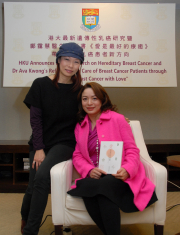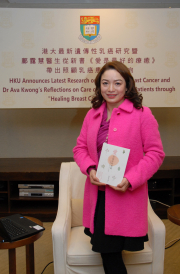Media
HKU Announces Latest Research on Hereditary Breast Cancer and Dr Ava Kwong’s Reflections on Care of Breast Cancer Patients through “Healing Breast Cancer with Love”
26 Jan 2016
Breast cancer is the most common cancer and the third leading cause of cancer deaths among Hong Kong females. Currently in Hong Kong, the breast cancer risk is 1 in every 17 in females, and the number of newly diagnosed breast cancer cases has increased threefold from 1993 to 2012. The age of patients diagnosed is also getting younger, causing concern in the society. Li Ka Shing Faculty of Medicine, The University of Hong Kong (HKU), Queen Mary Hospital, Tung Wah Hospital, Hong Kong Sanatorium & Hospital and Hong Kong Hereditary Breast Cancer Family Registry are carrying out the latest genetic screening in Hong Kong to identify BRCA mutation carriers and offer prevention and treatment for breast cancer patients.
Genetic screening for hereditary breast cancer
The aim of hereditary breast cancer genetic screening is to identify BRCA1 or BRCA2 mutation carriers for early management of breast cancer. The targeted participants of genetic screening are patients who have high risk of developing breast cancer. They include patients who have family history of breast, ovarian or other BRCA-related cancer, younger than 45 when diagnosed with breast cancer, and patients of triple-negative breast cancer.
The new genetic screening workflow includes collecting blood samples from high-risk patients and extract DNA from the samples. Scientists first detect hotspot mutations among Chinese population with SNaPshot screening using recurrent panel of BRCA1 or BRCA2 mutation hotspots developed by the research team. If no recurrent BRCA mutation is detected, it will then be subjected to full-gene sequencing by next-generation sequencing to detect BRCA1 or BRCA2 mutations. Compared to Sanger sequencing and next-generation sequencing, the new screening technique and workflow can greatly increase the efficiency of genetic screening and minimise the cost and turn-around time.
Research results
The research, which recruited 1,702 patients who have high risk of developing breast cancer, was conducted from 2007 to 2015. The overall BRCA mutation rate in Hong Kong is 9.2% and the BRCA mutation rate in Hong Kong male is 20.8%. The age of diagnosis of hereditary breast cancer patients is younger than normal breast cancer patients, and 68.5% of high-risk patients are aged 30 to 49.
The team also screened 372 high-risk breast cancer patients with SNaPshot screening. The recurrent panel of BRCA1 or BRCA2 mutation hotspots developed by the research team can identify recurrent BRCA mutations effectively. The BRCA1 and BRCA2 recurrent mutations pick-up rate is 3.49%, representing 40.6% of all BRCA1 and BRCA2 mutation carriers of the study cohort.
Apart from the new development in hereditary breast cancer genetic screening, the team also offered the latest platinum-based chemotherapy as neoadjuvant therapy to patients before surgery. If a BRCA mutation is identified in triple negative breast cancer patients, they are more responsive to platinum-based chemotherapy, resulting in a better prognosis for these patients, and patients who initially need to have mastectomy can choose to have breast conservation therapy.
The team also finds that genetic counselling and screening have a significant positive effect on breast cancer patients. Having thorough communications on cancer risk and efficacy of clinical management with patients is crucial, good rapport and relationships between clinicians and patients can make the patient journey a more positive experience. Particularly, in the process of genetic testing, family members are commonly involved and they also play a role in patient support and care.
Research implication and suggestions
The mutation status of high-risk patients and their families can now be confirmed by genetic screening. This is not only for prevention and early diagnosis of breast cancer, but also for changes in treatment strategies. Thereby, undergo BRCA genetic screening could improve clinical management.
Dr Ava Kwong, Clinical Associate Professor of Department of Surgery, Li Ka Shing Faculty of Medicine, HKU recommended high-risk breast cancer patients should undergo genetic screening for hereditary breast cancer, and manage breast cancer before any breast cancer symptoms develop.
About the research team
The research team was led by Dr Ava Kwong, Clinical Associate Professor of Department of Surgery, with contribution by various disciplines, including Dr Vivian Yvonne Shin, Research Assistant Professor of Department of Surgery and the laboratory team, Dr Joanne Chiu Wing-yan, Clinical Assistant Professor, Department of Medicine, Dr Chris Chan Tsun-leung, Honorary Associate Professor of Department of Surgery and Department of Pathology, Li Ka Shing Faculty of Medicine, HKU, and Dr Roland Leung Ching-yu, Medical Oncologist of Department of Medicine, Queen Mary Hospital. The research team would also like to thank the contribution of research nurses, medical staff, genetic counsellors and clinical psychologists in these Departments, and also the support from The Hong Kong Hereditary Breast Cancer Family Registry and Governmental grant.
Dr Ava Kwong’s new book on breast cancer patients
Other than providing clinical advice and options, Dr Kwong feels that part of being a good doctor is to have good communication with patients. With that, she is able to remember their unique stories. In her new book, Dr Kwong shares some heart touching stories of her patients to arouse public awareness on breast cancer. These stories help to heal, strengthen, motivate all cancer patients and remind them that they are not alone and the book is also a good story book for the general public to learn about breast cancer. The book profits will be donated to Hong Kong Hereditary Breast Cancer Family Registry to support Hong Kong Hereditary and High Risk Breast Cancer Programme (HRBCP), as well as genetic counselling and screening for patients with financial difficulties and are at high risk of BRCA mutations.
For photos and powerpoint presentation, please click the below link:
http://www.med.hku.hk/v1/news-and-events/press-releases
Dr Ava Kwong (Right), Clinical Associate Professor of Department of Surgery, Li Ka Shing Faculty of Medicine, HKU and breast cancer patient Ms Tong (Left).



